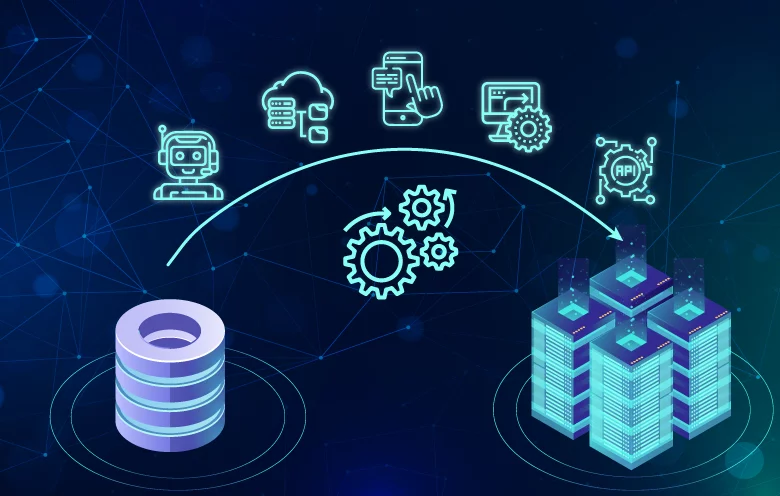Software is no longer just a support tool—it’s a strategic engine driving global transformation. In 2025, businesses across sectors are investing in intelligent, scalable, and industry-specific software to solve modern challenges. According to Statista, the global software market is projected to reach over $858 billion by the end of 2025, indicating a significant surge in demand for customized digital solutions.
From AI-powered diagnostics in healthcare to IoT-driven logistics optimization, software development services are reshaping how companies operate, innovate, and deliver value.
Healthcare: Precision, Speed, and Better Patient Outcomes
Healthcare has seen some of the most dramatic impacts from modern software. Solutions like electronic health records (EHRs), remote patient monitoring apps, and AI diagnostics are not only improving care but also lowering costs and errors. The integration of telehealth platforms and wearable device tracking has made patient care more accessible and real-time, especially in underserved areas.
Software developers are also enabling compliance with HIPAA and other regional data privacy laws through secure, encrypted systems—making custom-built healthcare platforms both innovative and compliant.
Logistics: Real-Time Tracking and Smart Dispatch
Logistics and supply chain operations rely heavily on data. Modern logistics software integrates GPS tracking, predictive analytics, and AI-driven route optimization. The result? Fewer delays, better fuel efficiency, and enhanced fleet visibility. Companies can also automate inventory, billing, and customer communication through custom dashboards and alerts.
For example, smart warehouse management systems use AI and RFID to monitor stock levels and reduce manual labor—accelerating order processing and boosting customer satisfaction.
Renewable Energy: Intelligent Monitoring and Load Management
In the renewable energy sector, software plays a vital role in optimizing resource usage and monitoring system performance. Applications are built to track solar panel output, battery efficiency, wind turbine maintenance cycles, and real-time energy distribution. These tools not only enhance ROI for providers but also contribute to sustainable energy production.
In the middle of these advancements, businesses seeking custom software development Canada services are increasingly turning to development partners who understand energy regulations, IoT hardware integrations, and environmental impact metrics.
Retail: Personalized Experiences and Smarter Operations
Retail has evolved into an omnichannel experience where software governs everything from backend inventory to frontend customer personalization. E-commerce platforms integrated with AI recommendation engines, chatbots, and digital wallets offer a seamless experience. Meanwhile, POS systems and CRM tools enable efficient staff management, sales reporting, and customer loyalty tracking.
Retailers leveraging custom software gain flexibility over off-the-shelf solutions—tailoring UX, branding, and features based on user behavior and business goals.
Agriculture: Data-Driven Farming and Resource Optimization
Farm tech is experiencing a digital renaissance. With smart irrigation systems, satellite crop monitoring, and weather prediction apps, software development is enabling precision farming. Farmers are now using mobile apps to monitor soil conditions, schedule maintenance, and even automate fertilization routines based on real-time data.
By integrating drones, sensors, and cloud analytics, agriculture businesses can reduce waste, maximize yield, and adapt to climate shifts faster than ever.
Manufacturing: Automation and Predictive Maintenance
In manufacturing, custom software supports machinery automation, predictive maintenance, and real-time quality control. Industrial IoT platforms connect sensors on factory floors to centralized systems that alert technicians before a breakdown occurs—reducing downtime and improving safety.
From digital twins to robotic process automation (RPA), developers are empowering manufacturers with agile, connected ecosystems that boost throughput and traceability.
Finance: Security, Speed, and User Experience
Financial institutions need to move fast while staying secure. Software development services are building AI-powered fraud detection systems, robo-advisors, and blockchain-enabled payment gateways. Meanwhile, APIs allow seamless integration between CRMs, accounting tools, and banking platforms.
User-centric fintech platforms offer 24/7 mobile access, multilingual interfaces, and personalized budgeting tools—creating trust and transparency for users.
Education: Smart Learning and Data-Driven Teaching
Education software is no longer just about online classes. It’s about adaptive learning platforms, AI-driven assessments, and school management systems. Teachers can personalize lessons, track student progress, and connect with parents—all from one platform. On the other hand, students enjoy immersive learning experiences powered by gamification, virtual labs, and real-time feedback.
Why Industry-Specific Software Matters
Generic software often falls short in addressing unique regulatory, operational, and user challenges of specific industries. That’s why organizations across sectors are choosing custom-built solutions that align perfectly with their workflows, data needs, and growth plans.
Software development partners that understand these niche requirements deliver not only better performance—but also long-term ROI.
Conclusion
In 2025, software development is more than code—it’s the backbone of digital evolution. From energy and agriculture to logistics and healthcare, industry-specific software empowers businesses to stay competitive, scalable, and responsive.
For companies looking to build smarter systems that serve real business outcomes, choosing the right software partner is no longer optional—it’s essential.
FAQs
1. What industries benefit the most from software development services in 2025?
Healthcare, logistics, finance, retail, manufacturing, agriculture, and renewable energy are among the top industries leveraging software development to enhance performance, reduce costs, and improve customer experiences.
2. How does custom software differ from off-the-shelf solutions?
Custom software is tailored to meet specific business needs, offering greater flexibility, integration, and scalability compared to generic off-the-shelf solutions that may lack critical features or adaptability.
3. Why is software important for digital transformation in business?
Software enables automation, real-time analytics, smarter decision-making, and improved customer engagement—key elements of digital transformation that help businesses stay competitive in a rapidly evolving market.
4. How is software development impacting the healthcare industry?
In healthcare, software is enhancing diagnostics, improving remote patient monitoring, simplifying compliance, and making data-driven treatment decisions possible—resulting in better outcomes and operational efficiency.
5. What should businesses look for in a software development partner?
Businesses should seek partners with industry expertise, a proven development process, strong UI/UX capabilities, post-deployment support, and experience in scalable, secure technology stacks.
